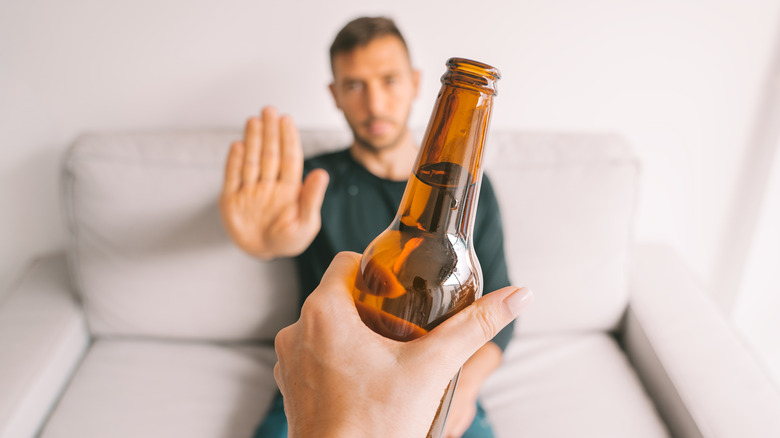Is Drinking In Moderation Possible With An Alcohol Use Disorder?
While the COVID-19 pandemic had us locked inside our homes, many turned to alcohol. According to a Harris Poll, 17% of people reported heavy drinking during the pandemic. They experienced withdrawal symptoms and blacking out. Some gave up activities that brought them pleasure so they could drink. These are some of the symptoms of alcohol use disorder (AUD), according to Yale Medicine. Other symptoms include unsuccessful attempts to reduce or manage your drinking, spending a lot of time drinking or recovering from its effects, or having alcohol affect your ability to complete tasks at work or home. Having two of these symptoms for more than a year is considered to be mild AUD, and its severity increases by the number of symptoms you report.
The Harris poll said that just 1 out of 6 people sought treatment for their heavy drinking, and those who didn't said they would be able to manage their drinking on their own. Yale Medicine says that even if you're a heavy drinker or occasionally binge drink, it doesn't necessarily mean you have an alcohol use disorder. However, both these behaviors put you at greater risk for AUD. Once someone seeks treatment for AUD, it's critical for their recovery to give up alcohol, according to Genesis Recovery. Yet for some people with AUD, cutting back their drinking to moderate levels just might be possible.
How heavy drinkers can reduce their drinking
A 2014 study in the Psychology of Addictive Behaviors found that some people might be able to cut back their drinking on their own. It all depends on how motivated they are about cutting back and how confident they are in their efforts. The researchers conducted assessments on people who were diagnosed with AUD and grouped them into three categories according to their level of confidence and their commitment to resisting heavy drinking. The people who had the most confidence and commitment were not only able to reduce their number of drinks per week but also reduced their number of drinking days in a week as well as drinks in a single day. The researchers found that the group of people with the lowest confidence and commitment to reducing their drinking also had a greater proportion of people who scored highest on problematic drinking measures. In other words, moderation might not be possible for all people with AUD.
Although many alcohol recovery plans emphasize abstaining from alcohol for the rest of one's life, others recognize that's not possible for everyone. According to Ria Health, medications can help people cut back on their drinking. Drugs like naltrexone convince the brain that alcohol isn't pleasurable, so it can help people learn to drink in moderation. Topiramate, which is typically used for epileptic seizures, also reduces alcohol cravings.
Who should abstain from alcohol
According to Genesis Recovery, some people in recovery might believe they can drink casually, but it might trigger cravings and old behaviors. They can sometimes control their drinking by only drinking on certain days of the week or promising never to drink alone, but this can soon lead to a more severe addiction. Even if someone with AUD takes a drink, their tolerance is much lower and the effects are more severe. For people who need to abstain, disulfiram makes people sick when drinking alcohol, and acamprosate balances the brain chemistry so you don't crave alcohol.
According to the Office of Disease Prevention and Health Promotion, you should abstain from alcohol if you're pregnant (or think you might be), take prescriptions or OTC drugs that could interfere with alcohol, or have a health condition. For all people, excess drinking puts you at risk for liver and heart disease, depression, stroke, stomach bleeding, and some types of cancer.
For men, moderate drinking means no more than 14 drinks per week or no more than four in a day. Women should have no more than seven drinks per week or no more than three a day.
If you or anyone you know needs help with addiction issues, help is available. Visit the Substance Abuse and Mental Health Services Administration website or contact SAMHSA's National Helpline at 1-800-662-HELP (4357).



